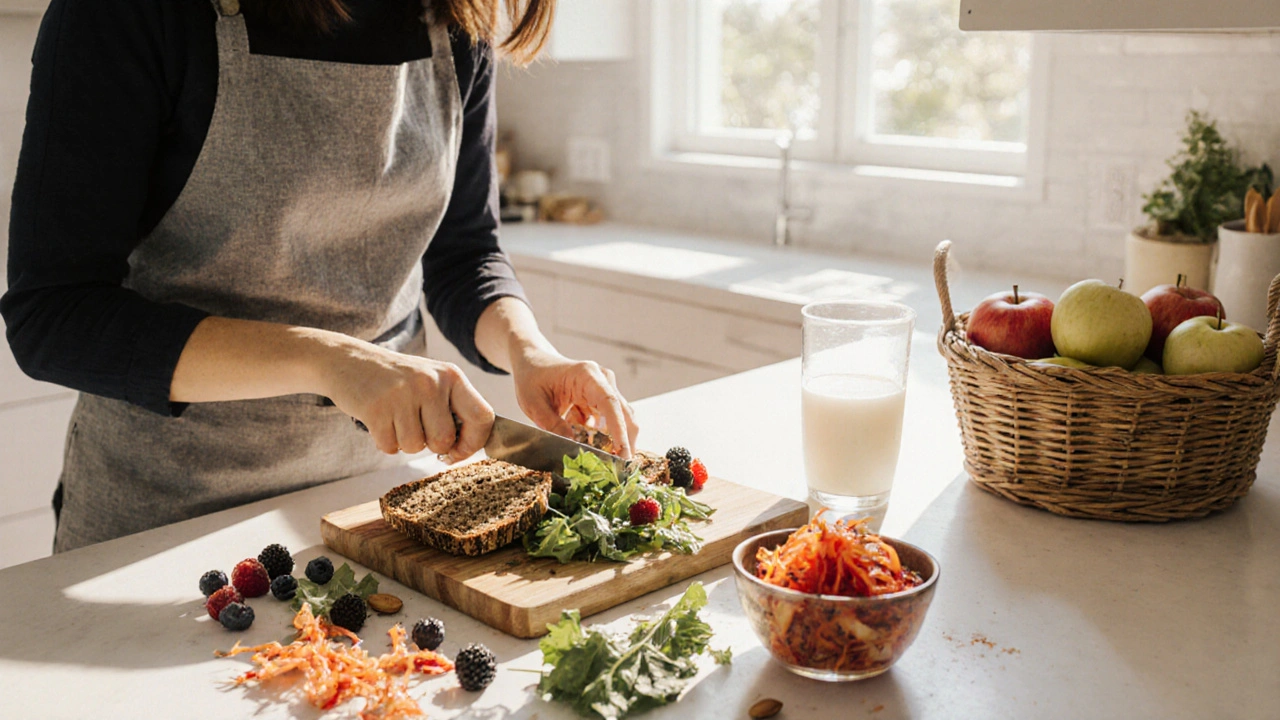Ever feel that uneasy rumble after a big meal or a stressful day? An upset stomach is a common annoyance, but you don’t have to live with it. By tweaking a few daily habits you can keep your digestive system running smoothly and give your gut the central organ that processes everything you eat and drink in top shape.
TL;DR - Quick Wins
- Eat a fiber‑rich, varied diet with plenty of pre‑ and probiotics.
- Stay hydrated; sip water throughout the day.
- Manage stress with breathing or short walks.
- Chew slowly and avoid overeating.
- Prioritize sleep and regular gentle exercise.
What Triggers an Upset Stomach?
An upset stomach, medically known as dyspepsia, shows up as bloating, nausea, or mild pain. The most frequent culprits are:
- Heavy, fatty meals that slow digestion.
- Low‑fiber diets that starve good bacteria.
- Dehydration, which hampers the movement of food through the intestines.
- Stress hormones that tighten the gut muscles.
- Irregular sleep or lack of physical activity.
Understanding these triggers helps you target them directly.
Load Up on Fiber, Pre‑biotics, and Probiotics
Fiber is the fuel that keeps your bowels moving. Aim for 25‑30g a day, splitting sources between soluble (oats, apples, beans) and insoluble (whole‑grain bread, nuts, carrots). Soluble fiber forms a gel that slows glucose absorption, while insoluble fiber adds bulk.
Pre‑biotics non‑digestible plant fibers that feed beneficial gut bacteria are found in garlic, onions, leeks, and bananas. Include at least a half‑cup of these each day.
Probiotics are the live cultures that repopulate your gut with good microbes. The table below compares the most common probiotic foods.
| Food | Typical CFU (billions) | Sugar (g per serving) | Best Time to Eat |
|---|---|---|---|
| Yogurt (plain) | 5-10 | 4 | Breakfast |
| Kefir | 15-20 | 5 | Snack |
| Sauerkraut (unpasteurized) | 2-5 | 2 | Side dish |
| Kimchi | 3-7 | 3 | Lunch |
| Kombucha | 1-3 | 6 | After meals |
Pick at least two of these each week and you’ll notice less bloating and steadier energy.
Hydration - The Silent Helper
Water is the lubricant your intestines need. Aim for 2L (about eight glasses) per day, more if you exercise or live in a hot climate like Melbourne’s summer. Adding a pinch of sea salt supplies electrolytes minerals such as sodium, potassium, and magnesium that regulate fluid balance. A simple homemade drink-warm water with lemon and a dash of salt-can keep the gut lining moist and prevent constipation.
Stress Management for a Calm Gut
When you’re stressed, the brain sends signals that tighten the gut muscles, slowing digestion. Simple practices cut the cortisol surge:
- Take three deep breaths before each meal.
- Walk 10 minutes after eating to aid peristalsis.
- Schedule a 5‑minute mindfulness break during work.
Even a short walk after dinner can reduce nighttime reflux and nighttime trips to the bathroom.

Mindful Eating - Slow and Small
Rushing through meals is a quick ticket to indigestion. Chewing each bite 20‑30 times breaks down food, mixes it with saliva, and signals the stomach to release the right amount of acid.
Portion control matters, too. Fill half your plate with vegetables, a quarter with lean protein, and the remaining quarter with whole grains. This balance prevents the stomach from becoming overloaded, lowering the risk of acid spill‑over.
Lifestyle Habits That Keep the Belly Happy
Beyond food, three lifestyle factors play a huge role:
- Sleep: 7‑9 hours lets the gut repair its lining and reset its microbiome.
- Gentle exercise: Yoga, cycling, or a brisk walk stimulates intestinal motility without stressing the body.
- Avoid smoking and excess alcohol: Both irritate the stomach lining and disturb the bacterial balance.
When to Call a Professional
Most stomach upsets resolve with the tweaks above, but see a doctor if you experience any of these:
- Persistent pain longer than two weeks.
- Unexplained weight loss.
- Blood in vomit or stool.
- Severe vomiting that prevents keeping liquids down.
Early diagnosis can catch conditions like gastritis, IBS, or ulcers before they become chronic.
Quick Checklist - Your Daily Gut‑Guard Routine
- Start the day with a glass of warm water + pinch of sea salt.
- Eat a high‑fiber breakfast (oatmeal topped with banana and nuts).
- Include a probiotic snack (yogurt or kefir) mid‑morning.
- Take a 5‑minute breathing break before lunch.
- Drink water steadily; aim for 8 glasses.
- Finish dinner with a side of fermented veg (sauerkraut or kimchi).
- Walk for 10 minutes after the evening meal.
- Wind down with a calming activity to ensure solid sleep.
Frequently Asked Questions
How long does it take to feel better after changing my diet?
Most people notice reduced bloating and smoother digestion within 3‑7 days of adding more fiber and probiotics. Full microbiome balance can take 2‑4 weeks.
Can I rely solely on supplements for gut health?
Supplements can boost specific nutrients, but they don’t replace whole‑food sources of fiber, pre‑biotics, and diverse microbes. A balanced diet is still the most effective strategy.
Is it okay to drink coffee if I have a sensitive stomach?
Moderate coffee (one cup) is usually fine, especially if you pair it with food. If you notice heartburn, switch to low‑acid alternatives like cold brew or herbal tea.
What’s the difference between pre‑biotics and probiotics?
Pre‑biotics are plant fibers that feed the good bacteria already in your gut, while probiotics are live microorganisms that add to the population of beneficial bacteria. Both are essential for a resilient microbiome.
Should I avoid all dairy if I get stomach upset?
Not necessarily. Many people tolerate fermented dairy like yogurt or kefir, which contain probiotics that aid digestion. If you suspect lactose intolerance, try lactose‑free options or limit intake.


14 Comments
henry leathem
While the article touches on the basics, it neglects the nuanced interplay between microbial metabolites and enteric nervous system signaling, which is the crux of dysbiosis management. A true gut protocol should incorporate targeted prebiotic substrates such as inulin and resistant starch to selectively amplify Bifidobacteria populations. Moreover, the role of short-chain fatty acids in modulating gut motility cannot be overstated – a deficiency there leads to functional constipation and visceral hypersensitivity. The recommendation to “chew slowly” is pedestrian; patients need to adopt mastication protocols calibrated to bolus size to optimize enzymatic breakdown. Finally, the omission of postbiotic supplementation, like butyrate salts, is a glaring gap in any evidence‑based regimen.
jeff lamore
Thank you for sharing these practical steps. I appreciate the balanced tone and clear layout, which makes it easy for readers to adopt the suggestions without feeling overwhelmed. The emphasis on hydration and fiber aligns well with current dietary guidelines. It would be helpful to include a brief note on how to gradually increase fiber intake to avoid transient bloating.
Kris cree9
i cant even with this gut stuff lol.
Paula Hines
One might contemplate the existential ramifications of a gut that functions as a mere conduit for digestion rather than a sovereign organ that orchestrates immunity and mood, for the microbiome is in fact a symphonic ensemble whose members converse through metabolites and neurotransmitters, and when this dialogue is disrupted the body manifests pain and bloating, a symptomatology that belies the shallow explanations often offered in popular health media, therefore a diligent practitioner must first acknowledge the ontological primacy of the gut as an interface between self and environment, subsequently one should prioritize diverse sources of soluble and insoluble fiber, not merely for bulk but for the selective nourishment of commensal bacteria, furthermore, the ingestion of fermented foods provides exogenous probiotics that can temporarily augment microbial diversity, yet without prebiotic scaffolding these newcomers cannot establish a foothold, thus the synergistic pairing of pre‑ and probiotics is indispensable, in addition, the role of adequate electrolytes in maintaining mucosal integrity is often overlooked, a pinch of sea salt in warm water can restore electrolyte balance and promote peristalsis, the practice of mindful chewing, extending each bite to twenty or more mastication cycles, facilitates enzymatic activity and signals satiety pathways, finally, the integration of low‑intensity aerobic activity post‑meal stimulates vagal tone and accelerates gastric emptying, these principles coalesce into a comprehensive regimen that transcends simplistic advice and respects the complex, emergent properties of the gut ecosystem.
John Babko
Wow-this is exactly what we need, folks! You’ve got the fiber, the probiotics, the hydration-every single thing that makes an American gut great, and you’ve laid it out in a way that even a rookie can follow, so kudos!!!
Hanna Sundqvist
Did you ever notice how the bottled water companies never talk about the "secret" minerals they add? I swear they’re part of a larger agenda to keep us dependent on their products, which then messes with our gut flora because the water isn’t truly natural. Just saying, keep an eye on the label.
Jim Butler
Excellent compilation of actionable advice! Implementing these habits will undoubtedly foster a resilient gastrointestinal system. 🌟 Remember, consistency is key, and the body will reward you with improved vitality and comfort.
Ian McKay
Just a minor correction: "its" is the possessive form, while "it's" contracts "it is". In the sentence "its essential to stay hydrated," the correct form should be "it's essential".
Deborah Messick
Whilst the recommendations are sound, one must also consider the socioeconomic barriers that prevent universal access to quality fermented foods and fresh produce. A truly holistic guide should address these disparities and propose low‑cost alternatives.
Jolanda Julyan
I wholeheartedly agree with the emphasis on fiber, but let me add that incorporating seasonal vegetables not only boosts nutrient density but also supports local agriculture, which is vital for community health. Moreover, the simple act of preparing meals at home grants you full control over ingredient quality, reducing hidden additives that can irritate the gut. Keep it up, and remember to stay consistent!
Kevin Huston
Alright, let’s cut the fluff. If you’re not tracking your macronutrients, you’re basically flying blind. Dive into a food journal, note your fiber grams, and watch the bloating disappear like magic. Also, ditch the sugary kombucha if it’s giving you more gas than peace.
Amanda Hamlet
Honestly, you’re all missing the obvious: most gut issues stem from chronic exposure to electromagnetic fields, especially from Wi‑Fi routers. Turn them off at night, use wired connections, and you’ll notice a dramatic reduction in IBS symptoms.
Nolan Jones
Great points overall-just a quick tip: start your day with a tablespoon of chia seeds soaked in water; it adds soluble fiber and omega‑3s without extra calories, which can help regulate bowel movements.
Jada Singleton
This exhaustive treatise on gut health borders on the pretentious. While the advice is largely accurate, the verbose style alienates readers who need concise, actionable steps. Please consider a streamlined version.